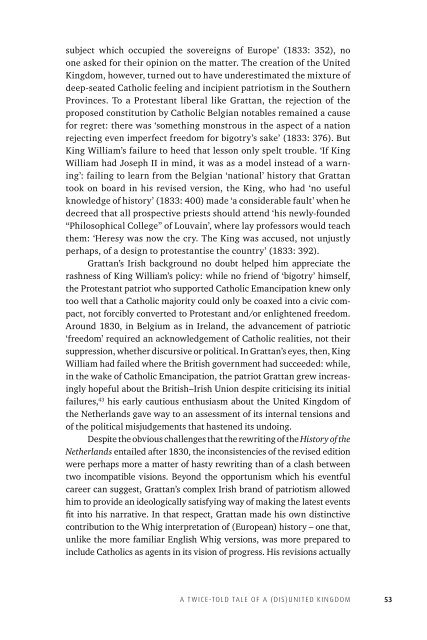Discord Consensus
7aze300jFJo
7aze300jFJo
Create successful ePaper yourself
Turn your PDF publications into a flip-book with our unique Google optimized e-Paper software.
subject which occupied the sovereigns of Europe’ (1833: 352), no<br />
one asked for their opinion on the matter. The creation of the United<br />
Kingdom, however, turned out to have underestimated the mixture of<br />
deep-seated Catholic feeling and incipient patriotism in the Southern<br />
Provinces. To a Protestant liberal like Grattan, the rejection of the<br />
proposed constitution by Catholic Belgian notables remained a cause<br />
for regret: there was ‘something monstrous in the aspect of a nation<br />
rejecting even imperfect freedom for bigotry’s sake’ (1833: 376). But<br />
King William’s failure to heed that lesson only spelt trouble. ‘If King<br />
William had Joseph II in mind, it was as a model instead of a warning’:<br />
failing to learn from the Belgian ‘national’ history that Grattan<br />
took on board in his revised version, the King, who had ‘no useful<br />
knowledge of history’ (1833: 400) made ‘a considerable fault’ when he<br />
decreed that all prospective priests should attend ‘his newly-founded<br />
“Philosophical College” of Louvain’, where lay professors would teach<br />
them: ‘Heresy was now the cry. The King was accused, not unjustly<br />
perhaps, of a design to protestantise the country’ (1833: 392).<br />
Grattan’s Irish background no doubt helped him appreciate the<br />
rashness of King William’s policy: while no friend of ‘bigotry’ himself,<br />
the Protestant patriot who supported Catholic Emancipation knew only<br />
too well that a Catholic majority could only be coaxed into a civic compact,<br />
not forcibly converted to Protestant and/or enlightened freedom.<br />
Around 1830, in Belgium as in Ireland, the advancement of patriotic<br />
‘freedom’ required an acknowledgement of Catholic realities, not their<br />
suppression, whether discursive or political. In Grattan’s eyes, then, King<br />
William had failed where the British government had succeeded: while,<br />
in the wake of Catholic Emancipation, the patriot Grattan grew increasingly<br />
hopeful about the British–Irish Union despite criticising its initial<br />
failures, 43 his early cautious enthusiasm about the United Kingdom of<br />
the Netherlands gave way to an assessment of its internal tensions and<br />
of the political misjudgements that hastened its undoing.<br />
Despite the obvious challenges that the rewriting of the History of the<br />
Netherlands entailed after 1830, the inconsistencies of the revised edition<br />
were perhaps more a matter of hasty rewriting than of a clash between<br />
two incompatible visions. Beyond the opportunism which his eventful<br />
career can suggest, Grattan’s complex Irish brand of patriotism allowed<br />
him to provide an ideologically satisfying way of making the latest events<br />
fit into his narrative. In that respect, Grattan made his own distinctive<br />
contribution to the Whig interpretation of (European) history –one that,<br />
unlike the more familiar English Whig versions, was more prepared to<br />
include Catholics as agents in its vision of progress. His revisions actually<br />
A twice-told tale of a (dis)united kingdom 53


